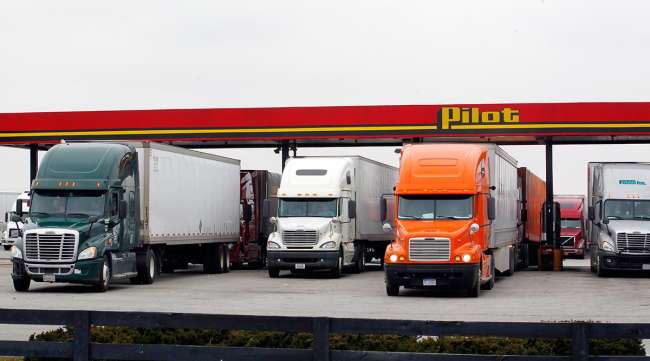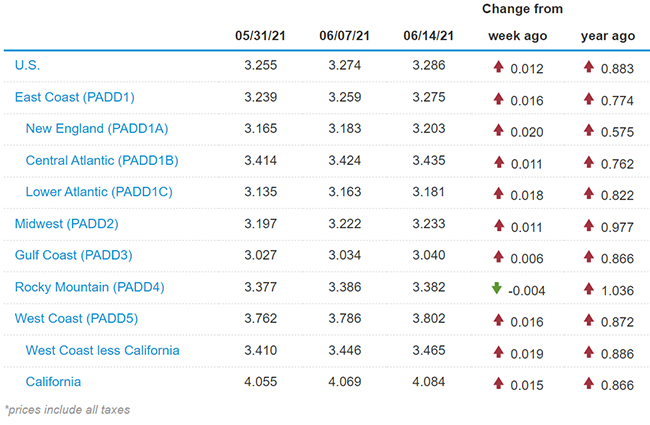Diesel Average Is Up 1.2¢ in Seventh Consecutive Increase

[Stay on top of transportation news: Get TTNews in your inbox.]
The nationwide average price of diesel fuel increased by 1.2 cents a gallon over the past week, according to data released June 14 by the Energy Information Administration.
EIA reported that diesel now costs an average of $3.286 a gallon, which is 88.3 cents more than it was a year ago. Trucking’s main fuel has increased in price for seven consecutive weeks, climbing 16.2 cents.
Prices rose in nine of the 10 regions surveyed by EIA; only in the Rocky Mountain Region did it fall, by four-tenths of a cent to $3.382 a gallon. New England saw the most significant increase at 2 cents to $3.203. The Gulf Coast region saw the smallest increase,0.6 cent, to $3.04.
California remains the most expensive region for diesel, rising 1.5 cents to $4.084 per gallon.
Highlights
• It is most expensive in California at $4.084 a gallon following a 1.5-cent rise, and least expensive in the Gulf Coast at $3.04 a gallon following a rise of six-tenths of a cent.
• The cost of diesel has increased now for seven consecutive weeks, climbing from $3.124 to $3.286 (16.2 cents) in that span.
• The average price increased in nine of the 10 regions surveyed by EIA; only in the Rocky Mountain Region did it fall, by four-tenths of a cent to an average of $3.382 a gallon.
• Gasoline saw an even bigger surge, as a 3.4-cent increase pushed the average nationwide price to $3.069 a gallon, 97.1 cents a gallon more than a year ago.
Meanwhile, gasoline climbed 3.4 cents to average $3.069 a gallon nationwide.
Phil Flynn, senior energy analyst at The Price Futures Group, noted there has speculation that fuel prices are going to level out soon, but he has his doubts. He said oil prices are holding onto their gains, which suggests that they will continue to move higher.
“We’re seeing the momentum from the reopening economy continue to drive prices,” Flynn told Transport Topics. “We’re seeing the passenger traffic go up, and there’s a possibility we’re going to see more planes added in the coming weeks. So, the demand outlook looks pretty strong right now.
“I think that when it comes to the on-road diesel, there’s a lot of people thinking that maybe prices will level out. But I’m not so sure.”
Flynn said the economy may be entering a new era of higher diesel prices, the reason being normal season trends coming amid the steady increases in prices.

Flynn
There also is the possibility of a surge in demand as the economy continues to break from the grip of the coronavirus pandemic.
“I think the one thing that could really hold us back is if prices spike too high,” Flynn said. “But our expectation is that the prices are going to continue to creep higher. So this is a new kind of year; the reopening of the economy globally, and you’re going to see pent-up demand for a lot of goods.
“So that’s going to keep our goods moving. And the refiners are going to have a more difficult time keeping up with demand because we’ve reduced some refining capacity.”
Many carriers deploy fuel surcharges to offset changes in prices. This means gradual changes don’t tend to have a huge impact on them even if they happen to be continuous such as the steady increases over the past seven weeks.
U.S. On-Highway Diesel Fuel Prices

EIA.gov
“UPS updates its fuel surcharge periodically to reflect the changes in the costs we incur for fuel and other operational costs to serve our customers,” Matthew O’Connor, senior manager of media relations at UPS Inc., told TT. “Our delivery charges are competitive, and our customers choose UPS because we offer a broad range of shipping, tracking and customer-service solutions.”
FedEx Corp. echoed a similar point on the impact of fuel surcharges.
“Fluctuations in fuel prices are managed through fuel surcharges in place for various FedEx services,” a FedEx spokesperson told TT. “Surcharges are subject to weekly adjustments based on various indexes, including the weekly published U.S. Gulf Coast [USGC] spot price for a gallon of kerosene-type jet fuel and the on-highway average price for a gallon of diesel fuel.”
Want more news? Listen to today's daily briefing below or go here for more info:




